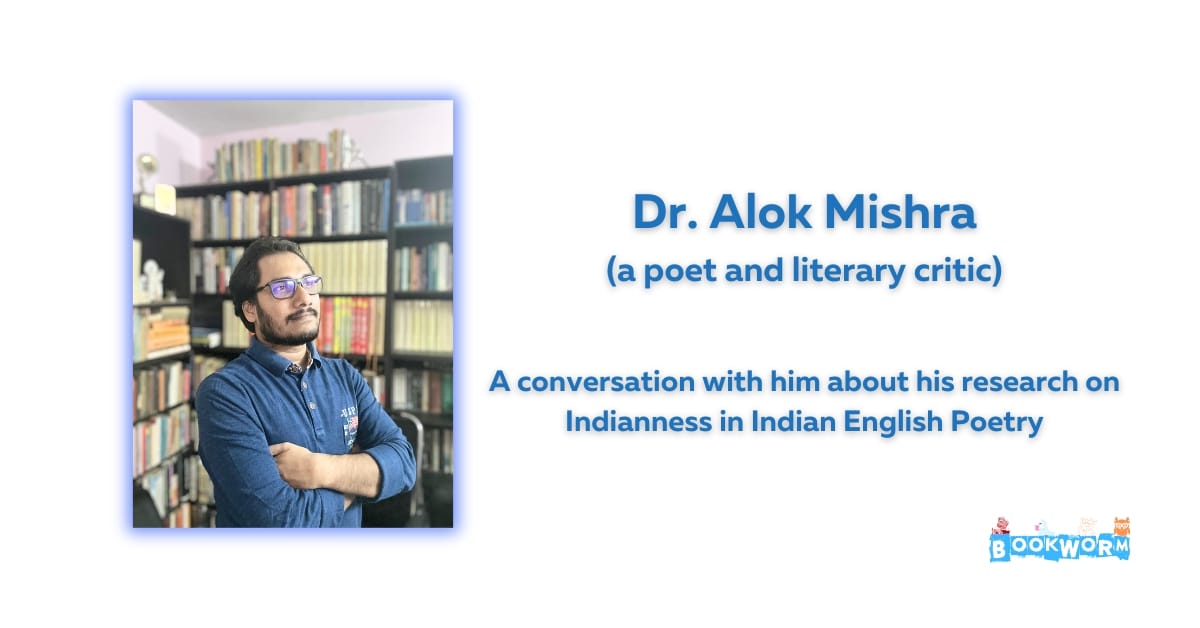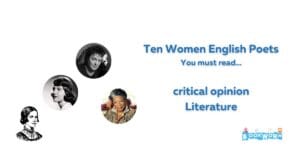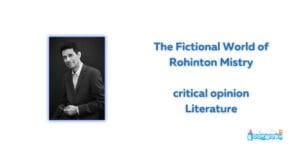Academic and Intellectual Profile: Dr Alok Mishra
Dr Alok Mishra is a distinguished Indian literary scholar, poet, critic, editor, and academician whose multifaceted contributions to the realm of English literature, particularly Indian English literature, establish him as a significant voice in contemporary literary scholarship. With a critical orientation rooted in both tradition and innovation, Dr Mishra has emerged as a rigorous commentator on the evolving dynamics of postcolonial Indian writing, the cultural negotiations of English in India, and the complex expression of national identity in Indian English poetry.
Earning his doctorate in English Literature with a focus on Indian English poetry, Dr Mishra has consistently demonstrated intellectual clarity, compositional finesse, and a deep engagement with the ideological and aesthetic underpinnings of literary texts. His academic journey reflects a steadfast commitment to upholding the standards of scholarly research, critical reasoning, and the ethical responsibilities that accompany the vocation of literary inquiry. He regards the title “Dr” not as a mark of privilege but as a solemn reminder of the commitment to meaningfully contribute to the intellectual community, an ethos he often articulates in his writings and public engagements.
Dr Mishra is perhaps best known for his analytical readings of Indian English poets, such as Nissim Ezekiel, A. K. Ramanujan, Jayanta Mahapatra, and Kamala Das, as well as for his reflective engagements with pioneering figures like Toru Dutt and spiritual-visionary poets like Sri Aurobindo and Rabindranath Tagore. His critical work is particularly attuned to the question of Indianness, a concept he approaches not merely as a cultural marker but as a dynamic site of inquiry, tension, and poetic expression. For Dr Mishra, Indianness in Indian English poetry signifies an ongoing dialectic between ancient civilisational values and modern socio-political realities. He has articulated this view with eloquence in numerous essays, lectures, and interviews.

As a poet himself, Dr Alok Mishra brings a rare dual perspective to literary criticism, enabling him to engage with texts not only through analytical precision but also with a poet’s sensitivity to form, rhythm, and metaphor. His critical insights are enriched by an intuitive understanding of the artistic process, and his creative writing complements his academic pursuits. His poems and critical essays have appeared in reputed journals and anthologies both in India and internationally. Moreover, he is the founder and editor-in-chief of Ashvamegh International Magazine and Indian Book Critics, two widely respected platforms that foster literary criticism, book reviews, and original creative writing. He has also established English Literature Education, a platform that provides quality study materials for literature students without any gatekeeping.
Beyond his scholarly and creative output, Dr Alok Mishra is a passionate educator and mentor. He has guided students and early-career researchers in navigating complex literary discourses, always encouraging intellectual independence while maintaining the rigour of scholarly engagement. His pedagogical philosophy centres on the idea of literature as a transformative force capable of transcending boundaries of language, region, and identity, and nurturing reflective, ethical, and culturally informed individuals.
Dr Mishra’s broader intellectual orientation is cosmopolitan while remaining firmly rooted in Indian philosophical traditions. He frequently draws upon the insights of ancient Indian scriptures and ethical frameworks to illuminate the dilemmas of modern life. His writing often weaves together the past and the present, producing a discourse that is simultaneously reflective and visionary. This ability to synthesise literary theory, spiritual philosophy, and socio-political critique gives his scholarship a distinctive and holistic dimension.

In sum, Dr Alok Mishra stands as a vital and inspiring figure in the field of Indian literary studies. His scholarship bridges temporal and thematic divides, questions received assumptions, and opens up new vistas for thinking about Indian English poetry. He engages with literature as both an artistic practice and a medium of intellectual inquiry. His voice, marked by composure, intellectual integrity, and a commitment to continuous learning, is indispensable to serious conversations about the role of Indian English literature in the national and global imagination.
Below is a detailed conversation with Dr Alok Mishra on the concept of Indianness in Indian English Poetry:
Team BookWorm Reviews (TBR):
Dr Mishra, thank you so much for joining me today. As someone who has studied Indian English literature extensively, your insights are invaluable. Let’s start with something foundational. You’ve held the “Dr” title for some time now. How do you personally perceive its meaning, especially within academia and intellectual spaces?
Dr Alok Mishra (AM):
Yes, completing research and earning the “Dr.” title before your name certainly matters a lot. However, it brings more responsibility rather than entitlement. Whenever you write, speak or discuss, your arguments should add value to the ongoing intellectual episode. You must be serious about everything you do. Your efforts should be grounded in composure and intellect, complemented by experience in dealing with high-quality texts that help you refine your thoughts and express the wisdom gained during your PhD years. You see, it is not an easy job! You must continue to defend the honour you have earned.
TBR:
That’s a very humble yet powerful reminder. The “Dr” prefix is not just an honour, it’s a continuous commitment to contribute meaningfully. Now, moving towards the heart of our discussion, how would you describe the evolution of Indian English poetry over the years? Has its journey been straightforward or filled with unique transformations?
AM:
Indian English Poetry, if you observe, follows a very interesting trajectory. Indian English poetry travels from being broad and universal to subjective and individual. In the beginning, poets like Sri Aurobindo and Tagore (if we consider poets because of their output and reception) wrote about the ideal world, morals and spiritual yearnings pervading the collective consciousness of a nation. The style evolved, becoming diverse, and the poetry became more precise and incisive in exploring the individual experiences of the poet as they tried to assimilate into the changing contours of the nation, newly independent and free from colonial rule, while grappling with postcolonial dilemmas and expectations. Although one may draw parallels with the growth of English poetry in general, there are many unique aspects to the development of Indian English poetry, contributing to its distinctive expansion in terms of themes and writing style, given its brief span of 120-150 years compared to the 500 years of British poetry.
TBR:
That comparison you make, between the longevity of British poetry and the relatively young tradition of Indian English poetry, is fascinating. And despite the shorter timeline, Indian English poetry has achieved a depth of expression that is both introspective and reflective of broader national questions. Would you say that the idea of Indianness plays a central role in shaping this literary form?
AM:
Though Indianness in Indian English literature may be many things at once, I can define the most striking connotation as its conflicting exploration of ancient glories and present conundrums, in isolation or conjunction. It is the same for Indian English poetry, to put it simply. The best poetry by Indian English poets has occurred only when we can visualise this apparent presence of a glimpse of the Indian past, its present or the tension between the ancient and the present playing out in the carefully crafted metaphors. The conflict unfolds beautifully in the poetry of the poets who gained prominence after India’s independence in 1947. Nissim Ezekiel, Jayanta Mahapatra, Arun Kolatkar, A. K. Ramanujan, and R. Parthasarathy appear to be the most notable names, to a great extent. Kamala Das and her poetry take many different turns through the course of her illustrious career.

TBR:
The phrase “conflicting exploration of ancient glories and present conundrums” really stands out to me. It captures a kind of poetic tug-of-war. Can you delve deeper into this “tension” you mention, perhaps with examples that might help students or early-career researchers better understand how this manifests in poetry?
AM:
To elaborate on my minimalist expression, Indianness in Indian English poetry as a tension between the ancient glory and the present conundrums, let me provide a few examples to clarify the concept for eager students. Toru Dutt, one of the finest Indian women English poets, raised her poetic castle on the glorious Indian past, Hindu symbols, mythology and history. She celebrated the ancient figures, legendary devotees, Gods and Goddesses. Sri Aurobindo and Tagore try to juxtapose the ancient spiritual and religious solutions and problems of their time in the poetry they produced. So much so that Gitanjali, which won Tagore the Nobel Prize in Literature, almost became the panacea from India for the West, which was sinking into the depths of its eroding social, familial, and spiritual values. In Sri Aurobindo’s best English poetry, the ancient Indian religious and spiritual richness flourishes fascinatingly, offering a glimpse of the rich Indian philosophy and heritage, and presenting the world with something beyond an individual solution – a collective opportunity to break down the walls of prejudices and become cosmopolitans in the truest sense of the word. Tagore’s and Sri Aurobindo’s poetic output aligns with the age-old messages embedded in ancient Indian scriptures. Prominent ones being वसुधैव कुटुम्बकम् (Vasudhaiv Kutumbakam – the whole world is one family), ये प्रपद्यन्ते मायामेतां तरन्ति ते (Ye Prapadgyante Mayametam Taranti Te, from the shloka 7:14 in Gita where Sri Krishna reveals the entire cosmos as his illusion (maya) and promises Moksha [salvation] from this illusionary bondage of life to those who take refuge in him), and many more.
TBR:
Those are such powerful examples. What strikes me is how ancient Indian wisdom becomes a kind of poetic foundation, a base upon which questions of modernity, identity, and even global relevance are built. However, I imagine that after independence, with a shift in national consciousness, the tone of poetry also underwent a change. Would that be a fair observation?
AM:
After independence, however, once the euphoria of national unity and the relentless pursuit of freedom culminated, people began to realise many other things around them. Expectations were high, and perhaps never met with reality on the ground. It laid the foundation for existential questions, realistic assessments and a sense of betrayal by our own. Led by the intellectual pole star, Nissim Ezekiel, poets began exhibiting the frustration of the countrymen with high ideals of life, the glories of the past and the hunger of the day. Ezekiel juxtaposes the ideals against the pervasive corruption, questioning the floods, the failing judiciary, deteriorating law and order, and the continually declining political standards. However, it is Nissim Ezekiel’s daring and bold intellectual boxing against the faith without questioning that marked the major shift in Indian English poetry after independence. In doing so, Ezekiel also sways the nature of engagement with Indianness in Indian English poetry. Before him, it was mostly about appreciating the ancient glory and revelling in past victories over human follies, guided by the Hindu scriptures, the very essence of the Indian way of life. With growing disillusionment in the political system and a deteriorating state of affairs, ancient values could no longer uphold righteousness. What was once praised is now questioned. Engagement with Indianness in Indian English poetry turned two-fold – poets not only questioned it, but also pitted it against the prevailing fall in social consciousness.
TBR:
Dr Mishra, what you just described as the shift from reverence to resistance is crucial in understanding how Indian English poetry matured. With Nissim Ezekiel already shaking the foundations, where did the next wave of poets take this discourse on Indianness?
Dr Alok Mishra (AM):
Emboldened by Ezekiel’s stance, poets like Keki N. Daruwalla took this confronting engagement with Indianness a little too far. In other words, Ezekiel’s poetry questioned the arch-idea of Indianness but with enough respect. Daruwalla, however, as it was inevitable, became too confident of his stance and ruthlessly questioned anything and everything even remotely tied to the civilisational idea of Indianness. Varanasi becomes a city of dead bodies; bringing Devi Durga home during Navaratris becomes a practice equal to getting a mistress home for a few days; Sri Krishna becomes an imposter who painted his body blue to fool people; reaching Kedarnath becomes a waste of time, scaling the height and worshipping a male genital…

TBR:
Those are intense images, jarring, even disturbing. But they certainly provoke reflection, which might be what Daruwalla intended. Do you think such portrayals were born of personal disillusionment, or was there something deeper, perhaps historical or socio-political, driving that kind of imagery?
AM:
Debates do need to happen whether Keki N. Daruwalla’s perception of India was marred by what he witnessed in the form of corruption and hopelessness-fed disillusionment that engulfed a large section of Indian states in the early years of self-ruling after independence or it was all a deliberate exercise for the purposes best known to the poet or, I do need to put it, if Daruwalla was actually unable to fathom what India stands for even after realising that he was a migrant whose ancestors must have fled his country chased by the tyrant invaders. Debates about Indianness in Indian English poetry and individual poets’ perception of India, as I mentioned earlier, do need to take place among scholars.
TBR:
That’s such a rich field for scholarly investigation. There’s this continuous oscillation in Indian English poetry between celebration and critique, reverence and irreverence, rootedness and alienation. When poets like Daruwalla seem to be dismantling traditional representations of Indianness, is it fair to say they are still, in a sense, engaging with it?
AM:
Yes, even in critique or ridicule, the poetic gaze is fixed upon Indianness. What changes is the tone, no longer devotional or celebratory, but interrogative, sometimes cynical, and at times despairing. Yet, this tension, this very act of confrontation, becomes a way of defining Indianness. It is not a singular or monolithic idea but a spectrum of beliefs, doubts, histories, traumas, and hopes.
TBR:
Beautifully said. So, would you agree that Indianness, as it manifests in Indian English poetry, is a kind of evolving idea, sometimes mythical, sometimes spiritual, other times historical, and in modern contexts, even political?
AM:
Absolutely. From Toru Dutt’s invocation of Hindu mythology and Sri Aurobindo’s philosophical idealism to Ezekiel’s realism and Daruwalla’s iconoclastic challenges, the Indian poetic voice in English has continually reshaped what Indianness means. It is less a fixed identity and more a dialectical process, of looking back, looking around, and occasionally, looking inward with doubt. It evolves with each poetic experiment, adapting itself to the emotional, historical and political milieu of the poet. And that is the strength of Indian English poetry: its capacity to hold contradictions without demanding resolution, its patience with paradoxes, and its refusal to be constrained by simplistic nationalistic or nihilistic binaries.
TBR:
There’s something poetic about that itself, the idea of Indianness as a “dialectical process.” As you pointed out, post-independence poetry grapples with betrayals of idealism, unfulfilled expectations, and a gnawing disillusionment. How would you suggest that students or new researchers approach this complex body of work?
AM:
To truly appreciate Indian English poetry, students must read widely and contextually. Understand the political, cultural and spiritual landscapes the poets inhabited. Read Toru Dutt not just for her language but for the way she elevates India’s past. Read Tagore and Aurobindo for their spiritual universality. Study Ezekiel for his courage in questioning and his honest portrait of urban India. Examine Daruwalla’s work critically, not dismissively, to understand the emotional and intellectual ruptures of a postcolonial nation. And most importantly, never reduce Indianness to one interpretation. It is multifaceted, sometimes glorified, sometimes distorted, often debated, and always evolving. Approach the poems with curiosity, humility and a readiness to unlearn, if necessary. Each poet holds a key to a different door of understanding. Let the journey through their words guide you, rather than rushing to conclusions.
TBR:
That’s such a necessary caveat, especially in our time when people are quick to reduce complex identities to binaries. And Indian English poetry refuses to be boxed in. Even the poets you’ve discussed, Tagore, Ezekiel, Das, Daruwalla, don’t fit any single mould. They’re each in conversation with a different India, aren’t they?
AM:
Yes. Every poet is in conversation with the India of their experience, their imagination, their learning, and sometimes their disillusionment. That’s what makes Indian English poetry so compelling. It isn’t just about rhyme or theme, it’s about the relentless human need to understand, to make sense of one’s place in a vast, plural, and often paradoxical nation. Tagore’s India is a spiritual quest; Ezekiel’s India is a critique of post-independence disillusionment; Kamala Das’s India is sensual, personal, and raw; and Daruwalla’s India is a battlefield of cultural symbols. Each is valid in its own right, yet incomplete without the others. To read Indian English poetry is to participate in this ongoing conversation with the nation and its layered realities.
TBR:
Dr Mishra, I feel this conversation has left me with so many questions and directions for further study. But also with a greater appreciation of the nuances and depth that Indian English poetry offers. To close, could you perhaps sum up what you believe is the enduring value or purpose of Indianness in Indian English poetry today?
AM:
Indianness in Indian English poetry today is not merely a cultural tag. It is an intellectual battleground, a spiritual home, a historical mirror, and often, a moral reckoning. Whether through reverence, rebellion, or reflection, poets continue to engage with what it means to be Indian in a language that was once imposed but is now indigenised. The enduring value lies in its power to stir the soul, question the present, honour the past, and anticipate a future where the essence of India is neither static nor surrendered, but continuously searched for. This idea of India may take many shapes in poetic form, from mythical and mystical to historical and critical, or even whimsical, but its presence remains a constant. It ensures that poetry, especially in English, remains rooted while it also reaches for universality. In the act of poetic creation, Indianness becomes not only the subject but also the method and the medium of expression. That, I believe, is its lasting contribution.
..
Thank you for reading this conversation. I hope you have a fair understanding of the concept of Indianness in Indian English literature and poetry.
..
Team BookWorm Reviews




